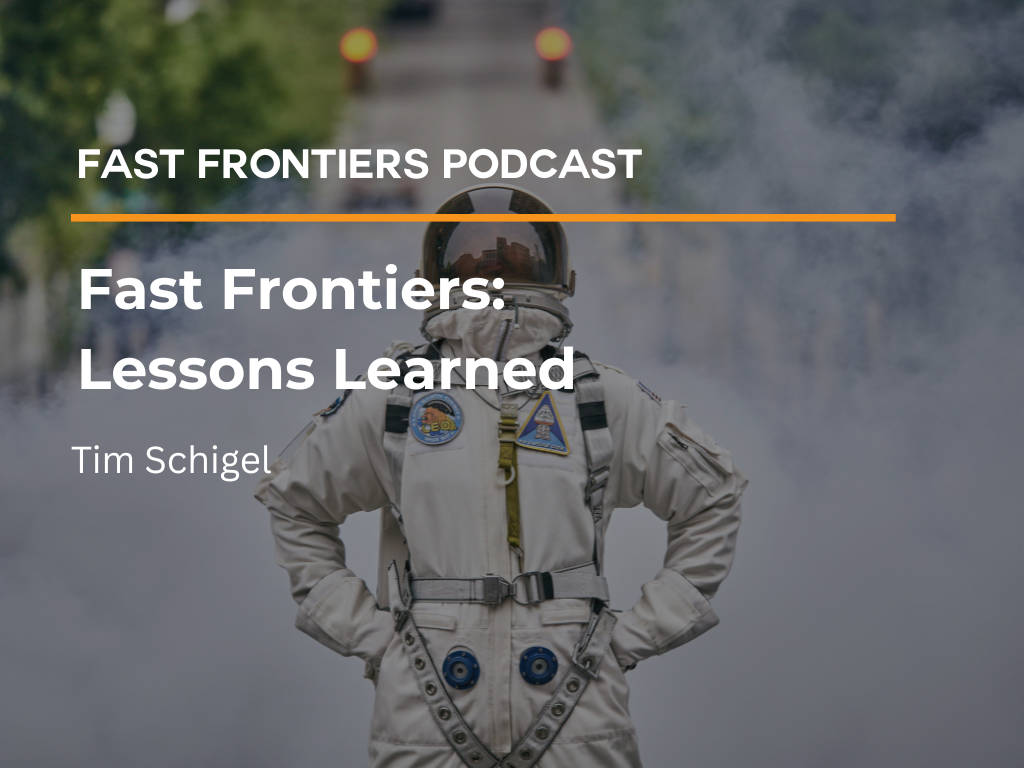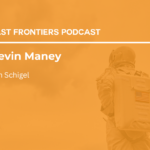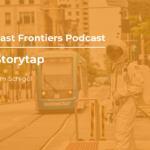At Fast Frontiers, we’ve had the privilege of hosting many extraordinary guests on our podcast this past season. We covered a lot of ground, addressing a vast array of topics and themes. Some of our favorite conversations revolved around the lessons those operating at the top of their game learned along the way.
Dhani Jones: Identifying Leadership
Dhani Jones is an entrepreneur, philanthropist, former NFL linebacker, and author who—among many other exciting subjects—spoke with Fast Frontiers about identifying leadership.
Jones’ explanation of effective leadership was highlighted by a fitting metaphor. Jones used music and harmonizing to explain what near-perfect leadership looks (or sounds) like.
He elaborated, using his own firsthand experience: “In my life, I think that I’ve always had really great conductors, great coaches. And when I haven’t had great coaches, it’s worked out too, but it didn’t feel the same way. You didn’t create the same music. And the best conductors, I think, empower the first chair to lead the orchestra, and all the conductor is essentially doing is moving their hand, but it’s really the first chair that is setting the melody of the entire orchestra, so to speak.”
Jones concluded that “If you want the symphony to continue, you have to learn how to play together.”.
Brian Hopcraft: The Importance of Asking for Help and Perseverance
We discussed boldness, self-confidence, and perseverance with Brian Hopcraft, Managing Director & General Partner at Lewis & Clark Ventures. When starting out, Hopcraft had to learn the hard way that there is no shame in asking for help. “I look back at the days of when I was an entrepreneur; I probably made every mistake in building and starting and growing a company you could make,” he shared.
Among those initial errors was his insistence on going it alone: “I had the foolish idea that I had to kind of figure it out on my own, and the reality is that there are so many people out there willing to help [if] you just reach out to them.”
Hopcraft contributed much of this inability to ask for help and lack of self-confidence to his having imposter syndrome. He shared how acknowledging that everyone has fear that they are learning how to manage and deal with was pivotal in his life. “Everybody has to deal with their own insecurities and their fears. And I think that’s just one fear that as an entrepreneur is you don’t know what obstacles you’re going to find, but there will be obstacles, and you get entrepreneurs who say, ‘I don’t know what it’s going to be, but when [those obstacles] happen, I’ll deal with it, I’ll figure it out, and we’ll get past it some way or another.’”
In the face of whatever obstacles arise, this perseverance is perhaps Hopcraft’s biggest lesson learned thus far. “I look back at my company, and there were so many things that happened that sometimes I just think about, gosh, I think I was not going to give up. And that got me through those really dark stages where [I was wondering] ‘How am I going to make payroll next Friday?’ or whatever it might be. You figure those things out, and it manages to work itself out one way or another.”
John Simon: Delivering Value in the For-Profit and Nonprofit Worlds
Our final highlight covers our podcast with John Simon, an active entrepreneur, creator, and investor in both the for-profit and nonprofit sectors. His current passion is for a non-profit he co-founded known as The GreenLight Fund, which helps transform the lives of children, youth, and families in high-poverty urban areas. As well as sharing many lessons learned, Simon discussed delivering value in both the for-profit and nonprofit worlds.
Although we often see these two as opposites, Simon showed us how they can work together for good. “What’s interesting is sometimes people see these as unrelated. On the one hand, you do the venture business. On the other hand, you have this philanthropic interest and this interest in this organization called Greenlight … but really, I kind of see it as one fabric,” explained Simon. Why does Simon see both for-profit and nonprofit as being from the same fabric? “Because what it’s all about is creating organizations that stand the test of time and that deliver value to people. And I’ve always been interested in that, both in the for-profit and the Commented [KG1]: Make infographic: Fast Frontiers Lessons Learned Season 3 1. Identify talent 2. Work together 3. Ask for help 4. Deliver value not-for-profit world. And I think you can learn lessons in both worlds that can cross-talk and help each other.”
Simon shared how this approach can be the best of both worlds for one ultimately greater world: “I sort of see these things seamlessly knit together. And obviously at this point, all the gains that I’m hopefully making on the venture capital side will come back to help fuel Greenlight and other kinds of nonprofit activities that help those amongst us who are most needing of just some scaffolding so that they can pull themselves up, and just realize their lives and dreams that they want to.”
To listen to these three podcasts in full, or to hear any of our other fascinating talks from this past season, head over to our website.



